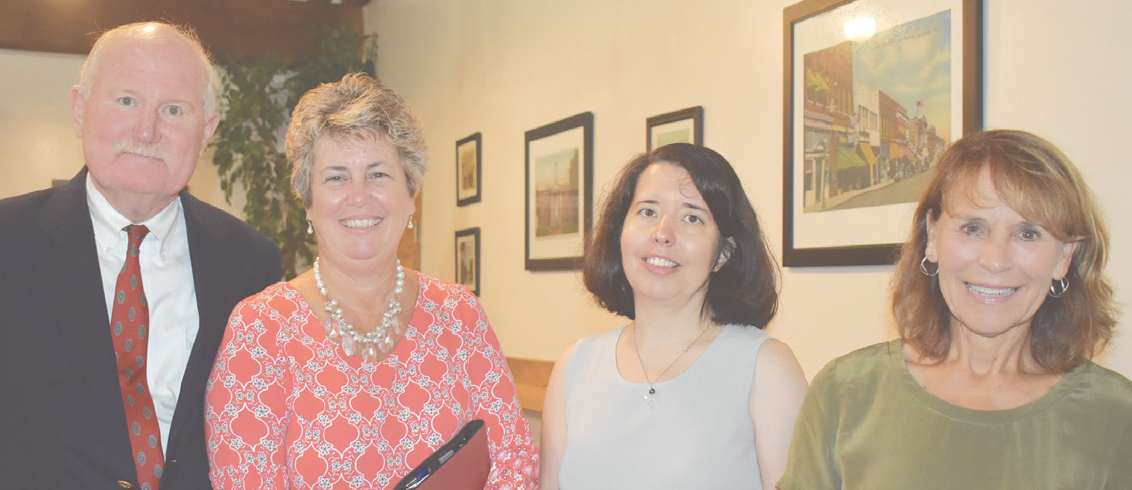Discussing economic progress
Published 10:07 am Wednesday, September 5, 2018

- Charlotte County officials attended a meeting with Virginia Secretary of Commerce and Trade Brian Ball held at Charleys Waterfront Cafe in Farmville. Pictured are, from left Charlotte County Industrial Development Authority (IDA) representative Red Moore, Commonwealth Regional Council Executive Director and Charlotte County native Melody Foster, County Purchasing Agent and Planner Monica Elder and IDA representative Sandra Towne.
Brian Ball, Virginia Secretary of Commerce and Trade, met with town and county leaders from the Heart of Virginia Thursday at Charleys Waterfront Cafe in Farmville to answer questions and facilitate discussion about fostering economic growth in the region.
Ball was appointed Secretary of Commerce and Trade in April and previously served as Special Advisor for Economic Development and Deputy Secretary of Commerce. During the meeting, he praised Prince Edward Director of Economic Development Kate Pickett Eggleston for organizing the event. Ball said his aim for the meeting was to learn about the issues facing the region and show that concerns and ideas would be shared at the state level, particularly by Gov. Ralph Northam.
“He was a product of rural Virginia,” Ball said about Northam, who grew up in the eastern shore outside Accomack County. “It’s vitally important to him that we have economic growth in all areas of the state.”
Representatives from Charlotte County, the Town of Farmville, Prince Edward County, Cumberland County, Buckingham County, Longwood University and Southside Virginia Community College took part in the meeting.
Several representatives from the Governor’s Office were present, in addition to Jeff Reed with Virginia Growth Alliance, Melody Foster with the Commonwealth Regional Council and Stephen Moret with Virginia Economic Development Partnership.
Charlotte County Industrial Development Authority (IDA) Bacon/Saxe districts representative Ralph “Red” Moore spoke about the difficulty in contacting state officials, particularly in finalizing permits with the Virginia Department of Environmental Quality (VDEQ).
Ball described the topic as a “hot potato political issue” and said progress has been affected due to cuts in funding to VDEQ. He asked localities to be patient with the organization.
“They’re dedicated people over there,” Ball said. “(They’re) working through huge projects with just a couple people.”
Moore, later in the meeting, asked about what could be done to help manufacturing companies, including timber and wood-manufacturing companies, based in the region to stay open. Referencing a few companies in Charlotte that recently closed and competitive rates overseas, he said the impact has left nearly 70 employees who, beginning in September, will not have jobs.
“Because they can’t compete,” Moore said.
Deputy Secretary of Commerce and Trade Cass Rasnick said there has been an impact on these industries in the state.
“These mills and forest businesses has allowed for … thousands of jobs,” Moore said. “They’re putting money back into the economy.”
“If something doesn’t change to assist the people that are doing this … it’s going south,” Moore said.
Ball said he was uncertain of programs or policies that would help these industries, but encouraged Moore to continue to support the county’s high-value industries, or those that could not be replicated by industries overseas.
“We’re a nation of innovators,” Ball said. “Those are high-value things that aren’t easy to replicate by somebody in China or somebody close by.”
Cumberland County Administrator and Attorney Vivian Seay Giles spoke about the need for broadband access in the region and said the county received a request from a broadband company for funding of $200,000 to support bring broadband to the region. She said the amount would be a lot for the county, but also said the county has struggled with receiving broadband access. Giles asked whether there could be state or federal subsidies available to bring broadband to the area, and whether the best solution would come from the federal level or from independent broadband organizations.
“What’s the likelihood that … there would be some subsidy in this way, because I don’t think the localities can do it,” Giles said. Ball said broadband is a serious concern he has heard in the region, and in portions of northern Virginia.
“It is intrinsically unfair for a kid in Fairfax to be able to go anywhere and be hooked to the internet, and for someone in some other part of Virginia to get on their bike or wait for someone to take them to a public place like a library. You just put that child way behind that other child and that just aint’ the way to do business,” Ball said.
He said there is no allocation on the federal level for rural broadband installation, and said it would require a change in Washington. Ball said a plan to address broadband access is expected to go to the Virginia General Assembly.
He said Rasnick has worked with the Virginia Tobacco Region Revitalization Commission on issues relating to rural Virginia.
Rasnick agreed with Giles and Ball, and said “we can’t have a conversation about economic development without talking about broadband.”
She said the United States Department of Agriculture Rural Development is establishing a pilot broadband access program for rural areas with populations of less than 20,000.
Buckingham County Board of Supervisors District Three Supervisor Don Matthews suggested having regional electric companies Southside Electric Cooperative (SEEC), Dominion Energy and Central Virginia Electric Cooperative (CVEC) come together. He said CVEC is meeting with Buckingham to create more widespread wifi access.
“We’ve already taken that next step,” Matthews said. “But we’d like to see the state give us a little bit of money or whatever you can do to help us get it out of the top and make it a reality.”
Ball encouraged regions to apply for assistance from the state, and spoke about collaborations between counties.
“What we see statewide is (counties) that go it alone, it’s much, much harder sledding than people who gather together and work regionally have a greater success rate because they can pull resources,” Ball said, saying the regional approach attracts state assistance in addition to businesses.
For substantial and long-lasting economic growth in the region, Letterpress Communications Founder Ilsa Loeser spoke about having local leaders prioritize existing businesses for expansion in place of bringing in new business, which sometimes do not generate jobs for people in the community.
“A hundred jobs that way is much more stable and impactful for us,” Loeser said





